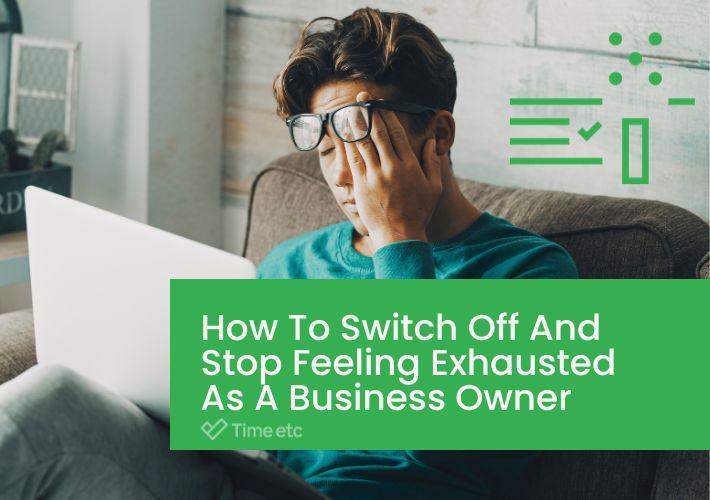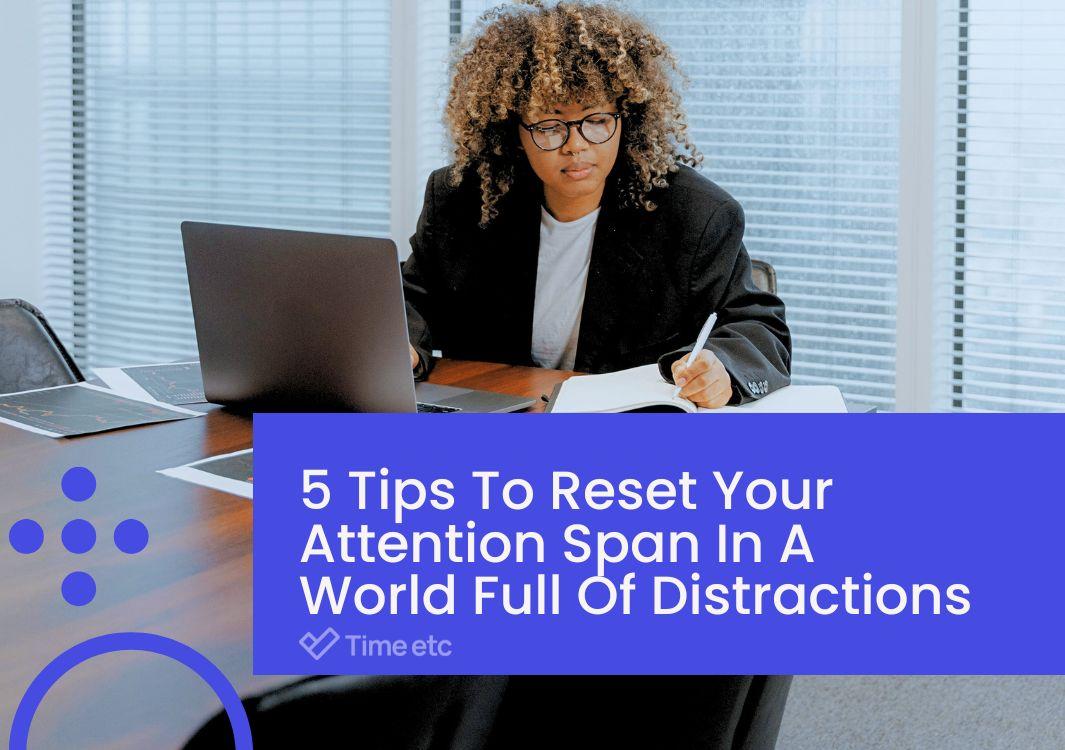It's 7 pm on a Friday evening. You're sitting at your desk with piles of paperwork surrounding you, barely able to keep your eyes open. Your phone lights up with texts from friends making weekend plans, but you know there's no way you'll be joining them. This brutal 80-hour work week has left you utterly exhausted, both mentally and physically. Plus, you've got even more to do on the weekend!
As an entrepreneur and small business owner, you likely put in long hours to make your business successful. This dedication is admirable, but there's such a thing as overdoing it. Constantly feeling tired and burned out will not just harm your health and personal relationships, it can also negatively impact your business performance.
To help guide you through the potential dangers of overworking and provide some insight into how you can reclaim control of your energy levels, we're going to explore the impact exhaustion has on productivity, how to set boundaries between work and life, and most importantly—how to finally start feeling refreshed and recharged again.
Business owner burnout: The toll of overworking
Pushing yourself to work nonstop takes a heavy toll, both physically and mentally. Ignoring signs of fatigue and forcing yourself to work excessive hours puts your health at serious risk.
Physical health impacts
Not getting adequate rest or recovery time leads to various physical health issues. Lack of sleep interferes with your body's natural repair processes. It also weakens your immune system. Skipping meals or exercise due to a packed schedule can also lead to weight gain. Spiked blood pressure or blood sugar spikes are also unfortunate possibilities.
One study found that people working over 55 hours per week have a 33% higher risk of stroke than those working standard hours. Clearly, overworking takes a major toll that should not be ignored.
Mental health impacts
Overworking is also strongly linked to mental health problems. Think depression, anxiety disorders, and even addiction issues. Without proper downtime, you may experience burnout, translating to:
- Lack of motivation
- Cynicism
- Disinterest in activities you once enjoyed.
Impact on productivity
Pushing through work exhaustion may seem like a no-brainer in the moment. After all, the more hours you work, the more you get done, right?
Not exactly.
It can actually hinder your performance and the quality of your work over time.
Mental fatigue from overworking makes it so much harder to concentrate when you need to. Ultimately, you won't think as creatively and make sound decisions. You may take longer to complete tasks or make costly errors that require rework. Overtired employees are also more likely to have memory or critical analysis lapses when tackling complex projects.
According to a Stanford University study, productivity per hour sharply declines when people work more than 50 hours per week. The research found that those working 70 hours get the same amount done as people working 55 hours, meaning that any additional time spent beyond 55 hours was essentially wasted. So the next time you're tempted to burn the midnight oil, remember that putting in extra hours doesn’t always equate to getting more done.
Impact on personal relationships
When we constantly work long hours, it leaves us with less time for the things that truly matter—our family, friends, and taking care of ourselves. Overworking can have a significant impact on our personal relationships and our overall work-life balance.
It's easy to miss important events and milestones when spending most evenings and weekends trying to catch up on work. Your kids' recitals, your spouse's birthday dinner, and those fun get-togethers with friends pass you by. It can feel as if life is happening without you.

A Time etc study: The delegation effect
A primary cause of feeling overwhelmed is the "do-it-all" attitude many of us are born with. And while it got you to where you are now, it could prove to be your downfall. Our recent study examined the delegation habits of small business owners and their effects on work-life balance. We surveyed 251 entrepreneurs about their workload management strategies.
The results showed a clear correlation between effective delegation and reduced burnout. Business owners who self-identified as "good delegators" reported higher job satisfaction. They had lower stress and better work-life balance than those who admitted they rarely delegate tasks.
Specifically,
- 60% of entrepreneurs who identified as "poor delegators" said they always feel tired.
- 67% reported that they never truly feel able to switch off from work.
- 60% of these bad delegators feel their loved ones at home suffer because they work such long hours.
Trying to do everything on your own is simply not sustainable. The most successful leaders understand this and surround themselves with a skilled team.
When you try to handle everything yourself, you risk being buried under a mountain of work and descending into the depths of burnout.
By building a team of capable individuals who can support you, you'll not only lighten your own load but create a more sustainable and successful business.
Learning to switch off and increase productivity
As a business owner, taking care of yourself is just as important as taking care of your business. It's important to actively set boundaries and learn to "switch off" at the end of each workday. By doing so, you allow yourself to refuel and recharge, which is essential for maintaining high spirits.
Understand (and avoid) Parkinson's Law
There's an insightful principle called Parkinson's Law that states, "Work expands to fill the time available." What this means is that an open-ended workload with no firm time limits will inevitably expand to eat up all your time.
For example, if you have two tasks that each take one hour to complete, but you give yourself three hours to finish them, you will likely use all three hours. As an entrepreneur with no one managing your schedule, you must take control and apply time limits to tasks yourself. This prevents work from endlessly spilling into your downtime.
Set realistic deadlines, block off breaks, and track your hours.
Not only does this prevent overwork and exhaustion, but it enhances your productivity, too. Knowing you only have a certain amount of time forces you to focus and maximize each working hour. You'll work more efficiently and waste less time. Embracing Parkinson's Law gives you your nights and weekends back while optimizing your work hours.
Set a consistent after-hours routine
Nothing signals the end of the workday like a regular after-hours routine. Developing rituals that cue your brain to transition from "work mode" to "relax mode" is very helpful. Getting into a daily rhythm builds the mental muscle memory needed to detach and switch off consistently.
One example is to ritualize shutting down your workspace by tidying up and packing away work materials. You can also:
- Change into casual clothes to shift your mindset as soon as you're home.
- Play your favorite music and take time to decompress.
- Light candles or diffusers to create a calming environment.
- Let your loved ones know that you're now off the clock and fully present.
The key is sticking to these wind-down habits consistently, not just when you feel like it. Make the transition out of the office and into your personal life part of your regular routine.
Leave work at work
Your home is your sanctuary, a place where you should be able to escape from the demands of work. It's crucial to maintain strong boundaries between your work and personal life, especially for the sake of your mental health.
When work spills over into your off-hours, you never truly get a break. It's like a constant shadow that follows you wherever your devices and assignments are present. This can lead to burnout, resentment, and even poorer quality family time.
To recharge fully, you need spaces that are completely work-free, both physically and mentally. Your home should be an oasis where you can relax, focus on loved ones, and do the things that refill your cup.
Here are some tips to keep work firmly in the office:
- Don't bring work devices into your bedroom or living spaces.
- Set office hours and stick to them.
- Enable out-of-office messages on email.
- Check notifications on a schedule, instead of whenever you hear a buzz.
Leaving work at the office allows you to return feeling genuinely recharged. Make your home a truly work-free sanctuary.

Digitally disconnect
In a similar vein, it takes a lot of willpower and dedication to truly disconnect in today's digital age. But regularly unplugging can make a huge difference to your mental well-being. When you are always reachable, it prevents you from ever fully switching "off."
Turn off any work email push notifications on your smartphone and tablet during evenings, weekends, and vacations. Set specific times to manually check your inbox, rather than being interrupted all day and night.
Similarly, resist the urge to constantly check work messaging outside of office hours. Set blocks of time where you don't open Slack or Teams, and consider turning your work phone off completely during vacations or visits with family. The messages will still be there when you power back on.
Digitally disconnecting trains your brain that you aren't always "on call." You'll be amazed at how much presence and peace of mind you reclaim. Make it a habit to regularly unplug from work.
Pick up a hobby
Taking part in hobbies and leisure activities outside of work can benefit your mental health tremendously. They help give your brain a much-needed break from the never-ending cycle of work-related thoughts.
Not only do hobbies bring you joy, but they also offer a wonderful opportunity for personal growth and fulfillment. You can spark your creativity, curiosity, and passions, and express yourself in ways that may have been neglected in the hustle and bustle of work.
Consider activities such as:
- Learning a musical instrument
- Joining a recreational sports league
- Reading fiction books unrelated to work
- Doing arts and crafts like knitting or woodwork
- Playing video or board games with family/friends
- Taking an evening dance or cooking class
- Volunteering with a local non-profit.
It doesn't have to be complicated or costly. Even simple things like family game or movie nights can provide mental reprieve and a gateway to a happier, more well-rounded you.
Know the signs of impending burnout
Ignoring the toll of overworking can gradually lead to burnout. This serious condition sneaks up on you, which makes it crucial to recognize its early warning signs. Pushing through exhaustion rather than taking real breaks eventually backfires.
Look out for these common burnout symptoms that may indicate your health and performance are suffering:
- Increased irritability, impatience, and frustration
- Lack of energy and focus
- Feeling disinterested in work and other activities
- Cynicism, negativity, and feeling like nothing matters
- Frequent headaches, insomnia, digestive issues
- Working longer hours without increased productivity
- Skipping social engagements and isolating.
Take these red flags seriously before you reach a breaking point. Listen when your body and mind scream for relief. Burnout takes a long time to heal and damages your health, relationships, and performance. So, don't let it catch you.

What's the bottom line?
Remember, prevention is always better than cure. Your business needs you at your best, so taking care of your needs will serve your company's success better in the long run.
This means setting firm boundaries around your work hours and learning to "switch off" through healthy routines. With these simple steps, you can build a sustainable workload that energizes rather than drains you.










